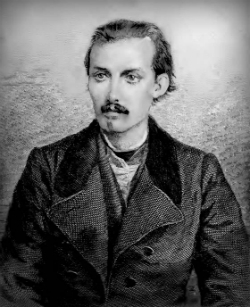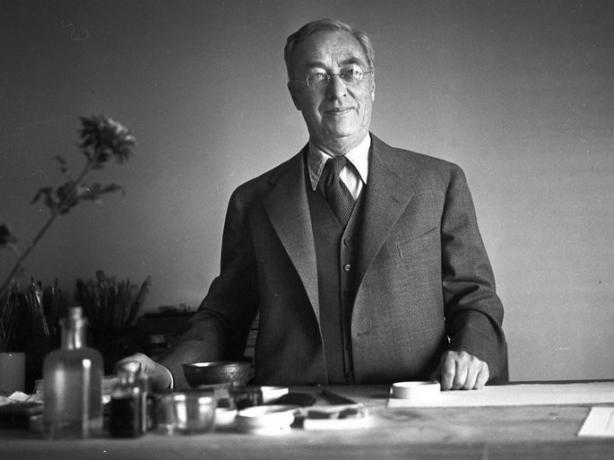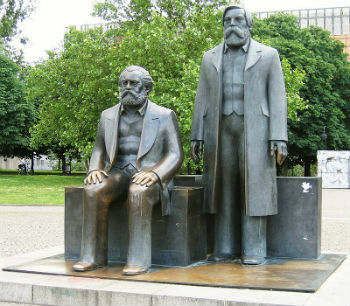Casimiro de Abreu he was one of the greatest poets of the second romantic generation in Brazil. This period was marked by themes related to love, disappointment and fear.
He lived and wrote little, however, he showed in his poetry a naive lyricism of a teenager, represented by himself in his only book “the springs”.
Biography

Casimiro José Marques de Abreu was born in Barra de São João, in the State of Rio de Janeiro, on January 4, 1839. At just 13 years old, sent by his father, he goes to the city of Rio de Janeiro to work in commerce.
In November 1853, he traveled to Portugal, with the aim of completing his commercial practice, and during this period he began his literary career. On January 18, 1856 his play Camões and Jaú is staged in Lisbon.
Casimiro de Abreu returned to Brazil in July 1857 and continued to work in commerce. He meets several intellectuals and befriends Machado de Assis, both 18 years old. In 1859 he published his only book of poems “the springs”.
At the beginning of 1860, Casimiro de Abreu became engaged to Joaquina Alvarenga Silva Peixoto. With a bohemian life, he contracted tuberculosis.
He goes to Nova Friburgo to try to cure the disease, but on October 18, 1860, he doesn't resist and dies, at the age of 21.
Main Works
Casimiro died very young and, therefore, published only one work of poetry entitled the springs (1859). From his poems, the following stand out:
- my eight years
- Longing
- my soul is sad
- love and fear
- Desire
- pains
- Cradle and Grave
- Childhood
- the waltz
- Forgiveness
- Poetry and Love
- secrets
- Last Sheet
poems
Check below some excerpts from the best poems by Casimiro de Abreu:
my eight years
Oh! I miss you
From the dawn of my life,
from my dear childhood
That the years bring no more!
What a love, what a dream, what flowers,
in those smoky afternoons
In the shade of the banana trees,
Under the orange groves!
how beautiful the days are
From the dawn of existence!
— Breathe the soul innocence
Like flower perfumes;
The sea is — a serene lake,
The sky — a bluish mantle,
The world — a golden dream,
Life — a hymn of love!
What a dawn, what a sun, what a life,
what melody nights
in that sweet joy,
In that naive play!
The sky embroidered with stars,
The land of aromas full
the waves kissing the sand
And the moon kissing the sea!
Oh! days of my childhood!
Oh! my spring sky!
How sweet was life
On this smiling morning!
Instead of the hurts of now,
I had these delights
from my mother the caresses
And kisses from my sister!
Free child of the mountains,
I was very satisfied,
From the open shirt to the chest,
— Bare feet, bare arms —
running through the meadows
The waterfall wheel,
behind the light wings
From the blue butterflies!
in those blissful times
I was going to harvest the pitangas,
I fucked taking off my sleeves,
He played by the sea;
He prayed to the Hail Marys,
I thought the sky was always beautiful.
I fell asleep smiling
And I woke up singing!
my soul is sad
My soul is sad as the dove in distress
That the forest wakes up from the dawn of dawn,
And in a sweet arroyo that the hiccup imitates
The moaning dead husband cries.
And, like the turtledove that lost her husband,
My soul cries the lost illusions,
And in your book of fanado enjoyment
Reread sheets that have already been read.
And as weeping notes
Your poor singing with the pain faints,
And your moans are equal to the complaint
That the wave lets go when it kisses the beach.
Like the child who bathed in tears
Look for the earring that took you to the river,
My'soul wants to resurrect in the corners
One of the lilies that withered the summer.
They say there are joys in mundane galas,
But I don't know what the pleasure is.
— Or just in the countryside, or in the noise of the rooms,
I don't know why—but my soul is sad!
exile song
If I have to die in the prime of years
My God! don't be already;
I want to hear it in the orange tree, in the afternoon,
Singing the thrush!
My God, I feel and you can see that I'm dying
Breathing this air;
Make me live, Lord! give me again
The joys of my home!
the most beautiful foreign country
What the homeland does not have;
And this world is not worth one kiss
So sweet of a mother!
Give me the gentle places where I played
There on the children's court;
I can see the sky of the motherland once,
The sky of my Brazil!
Read more about the romantic movement in Brazil:
- Romanticism in Brazil
- Romanticism: Characteristics and Historical Context
- Romantic Generations in Brazil
- The Language of Romanticism
- Brazilian Romantic Poetry
- Second Generation Romantic



